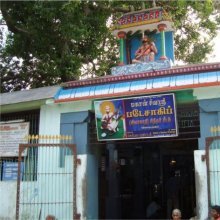Mahan, Mahān: 11 definitions
Introduction:
Mahan means something in Hinduism, Sanskrit, Marathi, Hindi. If you want to know the exact meaning, history, etymology or English translation of this term then check out the descriptions on this page. Add your comment or reference to a book if you want to contribute to this summary article.
Images (photo gallery)
In Hinduism
Purana and Itihasa (epic history)
Source: Wisdom Library: Bhagavata PuranaMahān (महान्)—One of the eleven other names of Rudra, according to the Bhāgavata Purāṇa 3.12.12.
Source: archive.org: Puranic Encyclopedia1) Mahān (महान्).—A King of the Pūru dynasty. He was the son of Matināra. (Mahābhārata Ādi Parva, Chapter 94, Verse 14).
2) Mahān (महान्).—The son of the Agni Bharata, who was a Prajāpati. Mahābhārata, Vana Parva Chapter 219, Verse 8 states that he was a much revered person.
Source: Cologne Digital Sanskrit Dictionaries: The Purana Index1a) Mahān (महान्).—A son of Dhīmān.*
- * Brahmāṇḍa-purāṇa II. 14. 69; Vāyu-purāṇa 33. 59.
1b) One of the twenty Amitābha gods.*
- * Brahmāṇḍa-purāṇa IV. 1. 17; Vāyu-purāṇa 100. 16.
1c) A son of Śatarūpā.*
- * Matsya-purāṇa 4. 25.
1d) Manas (mind); came out of Prakṛti (sūkṣma śarīram); out of this mahas came other things; mati or wisdom is Brahmā; buddhi is bhū; khyāti is Īśvara; Prajña citti; smṛti, samvid; ety of; its two vṛttis sankalpa and adhyavasāya;1 attains virāra during Pralaya;2 a pradhāna tatva.3

The Purana (पुराण, purāṇas) refers to Sanskrit literature preserving ancient India’s vast cultural history, including historical legends, religious ceremonies, various arts and sciences. The eighteen mahapuranas total over 400,000 shlokas (metrical couplets) and date to at least several centuries BCE.
Shaktism (Shakta philosophy)
Source: Google Books: ManthanabhairavatantramMahān (महान्) refers to the “great (plane of existence)”, according to the Ṣaṭsāhasrasaṃhitā, an expansion of the Kubjikāmatatantra: the earliest popular and most authoritative Tantra of the Kubjikā cult.—There are several variant forms of the name of the goddess Mahāntārikā—the Great Saviouress. The most common one in the Kubjikāmatatantra is Mahāntārī, which appears as many as ten times. [...] The Ṣaṭsāhasrasaṃhitā explains that ‘she who is called Mahāntārī saves from the great ocean (of transmigration)’. The commentary elaborates: ‘she who saves (tārayati) from the great (mahān) plane (of existence), that is, from the world of transmigration, is Mahāntārī.’

Shakta (शाक्त, śākta) or Shaktism (śāktism) represents a tradition of Hinduism where the Goddess (Devi) is revered and worshipped. Shakta literature includes a range of scriptures, including various Agamas and Tantras, although its roots may be traced back to the Vedas.
Languages of India and abroad
Marathi-English dictionary
Source: DDSA: The Molesworth Marathi and English Dictionarymahān (महान्).—a masc (S) Great, big, large. 2 Late;--used of corn and grain. 3 Continuing through two or more years;--used of varieties amongst annual or deciduous plants.
Source: DDSA: The Aryabhusan school dictionary, Marathi-Englishmahān (महान्).—a m Great, big.
Marathi is an Indo-European language having over 70 million native speakers people in (predominantly) Maharashtra India. Marathi, like many other Indo-Aryan languages, evolved from early forms of Prakrit, which itself is a subset of Sanskrit, one of the most ancient languages of the world.
Sanskrit dictionary
Source: Cologne Digital Sanskrit Dictionaries: Cappeller Sanskrit-English DictionaryMahan (महन्).—[neuter] greatness, abundance, might (only [instrumental] sgl. & [plural]).
Source: Cologne Digital Sanskrit Dictionaries: Monier-Williams Sanskrit-English DictionaryMahan (महन्):—[from mah] n. greatness, might, power, abundance (only [instrumental case] sg. mahnā and once [plural] mahabhiḥ, which also = greatly, mightily, right heartily), [Ṛg-veda]
[Sanskrit to German]
Sanskrit, also spelled संस्कृतम् (saṃskṛtam), is an ancient language of India commonly seen as the grandmother of the Indo-European language family (even English!). Closely allied with Prakrit and Pali, Sanskrit is more exhaustive in both grammar and terms and has the most extensive collection of literature in the world, greatly surpassing its sister-languages Greek and Latin.
Hindi dictionary
Source: DDSA: A practical Hindi-English dictionaryMahan in Hindi refers in English to:—(a) great; big; eminent; ~[ta] greatness; eminence, nobility..—mahan (महान) is alternatively transliterated as Mahāna.
...
See also (Relevant definitions)
Starts with (+224): Maha-nagara, Mahamaho, Mahamte, Mahamtu, Mahamtubogu, Mahana, Mahanabata, Mahanabha, Mahanad, Mahanad-prabhu, Mahanada, Mahanadi, Mahanadisagarasamgama, Mahanadu, Mahanaga, Mahanaga Vihara, Mahanagahana, Mahanagahula, Mahanagakula, Mahanagapabbata.
Ends with: Atimahat, Atmahan, Brahmahan, Damahan, Dharmahan, Durnamahan, Kremahan, Marmahan, Samahan, Sumahan, Vari mahan.
Full-text (+68): Mahantaka, Apamarda, Vari mahan, Mahat, Mahana, Mamyadala, Mahadhur, Kautuka, Halsandhi, Grasikar, Kridana, Upashloka, Upamarda, Grasagrasikri, Agraganya, Dhanayati, Atiratha, Nirudara, Akrishta, Brahmasavarni.
Relevant text
Search found 74 books and stories containing Mahan, Mahān; (plurals include: Mahans, Mahāns). You can also click to the full overview containing English textual excerpts. Below are direct links for the most relevant articles:
Garga Samhita (English) (by Danavir Goswami)
Verse 5.16.22 < [Chapter 16 - Comforting Sri Radha and the Gopis]
Verse 3.4.11 < [Chapter 4 - The Coronation-Bathing of Śrī Kṛṣṇa]
Verse 6.10.15 < [Chapter 10 - In the Description of the Gomatī River, the Glories of Cakra-tīrtha]
Sushruta Samhita, volume 3: Sharirasthana (by Kaviraj Kunja Lal Bhishagratna)
Mahabharata (English) (by Kisari Mohan Ganguli)
Section CCCXII < [Mokshadharma Parva]
Section CCCIII < [Mokshadharma Parva]
Section VIII < [Ashvamedhika Parva]
Bhakti-rasamrta-sindhu (by Śrīla Rūpa Gosvāmī)
Verse 1.2.172 < [Part 2 - Devotional Service in Practice (sādhana-bhakti)]
Verse 2.1.250 < [Part 1 - Ecstatic Excitants (vibhāva)]
Cidgaganacandrika (study) (by S. Mahalakshmi)
Verse 88 [Viśvalayarūpa Samādhi] < [Chapter 3 - Third Vimarśa]
Verse 221 [Kāli’s Ultimate form is beyond imagination] < [Chapter 4 - Fourth Vimarśa]
Verse 76 [Ādya-spandharūpa-Śaktipītha] < [Chapter 3 - Third Vimarśa]
Rig Veda (translation and commentary) (by H. H. Wilson)

